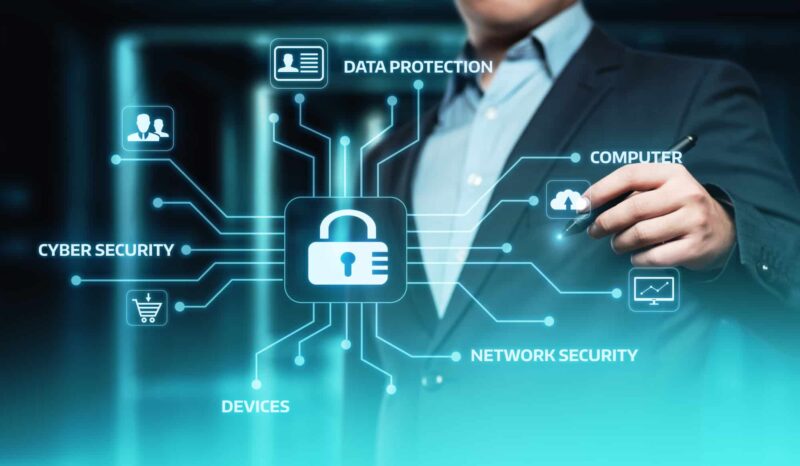The Importance of IT Network Security

In this day and age, IT network security is more important than ever. With so much sensitive data being transmitted back and forth online, it’s essential to make sure that your computer network is secure.
Hackers are always looking for new ways to steal information or cripple your systems. The same hackers that cost businesses in the US a whopping $15.4 million every year.
Since business owners wear many hats, it’s easy for them to bump IT network security to the back burner. Doing so, however, works to their detriment, with some losing much more than they’ll ever recover.
Is investing in robust network security a worthwhile investment? In today’s post, we’ll be discussing the importance of IT network security and ways to protect your business or personal computer network.
Table of Contents
ToggleIt’s a Crucial Component of Cybersecurity
IT network security forms one of the major crucial pillars of cybersecurity. In case you’re not already aware, cybersecurity encompasses all measures used to protect your networks and systems from digital attacks. You can refer to Google’s expertise to help you learn and understand more about their cybersecurity.
These days, it’s not just businesses that need to worry about cybersecurity threats; individuals do as well. After all, we now live in a world where our most sensitive data is stored online.
From social security numbers and credit card information to medical records and tax returns, hackers now have more access than ever before to our personal data.
Network security is now more important than ever because it helps protect all of this sensitive information from falling into the wrong hands.
It Helps Protect Customer/ Client Data
If you run a business, one of the most important things you need to protect is your customer or client data. After all, customers are the lifeblood of your business.
If customers trust you with their personal information, it’s your responsibility to keep it safe from hackers. In the event that hackers breach customers’ data, it could not only ruin your reputation but also cost you a bundle in lawsuits.
When Equifax, one of the largest credit reporting agencies in the US, was hacked in 2017. The hack resulted in the personal information of over 145 million people being compromised.
While Equifax did eventually offer affected customers free credit monitoring and identity theft protection services, the damage had already been done.
The moral of the story is that if you want to keep your customers or clients happy, you need to do everything in your power to protect their data. And one of the best ways to do that is by investing in IT network security.
Network Security Helps Protect Sensitive Data
As we mentioned earlier, IT network security is a crucial component of cybersecurity. And one of the main reasons why it’s so important is because it helps protect all sensitive data transmitted online.
This includes everything from financial information and medical records to trade secrets and military intelligence. In short, if there’s something you don’t want falling into the wrong hands, network security is a must.
Cyber attacks are ever-evolving and one of the best ways to protect your sensitive data is by encrypting it. This means that even if hackers were to get their hands on your data, they wouldn’t be able to make sense of it.
Of course, encryption is just one layer of protection. There are many other steps you can take to further secure your data, which we’ll be discussing later on in this post.
But for now, just know that if you want to protect your sensitive data, network security is a must.
Network Breaches Cost a Ton of Money
Not only do network breaches put your reputation on the line, but they can also cost you a lot of money.
In fact, the average cost of a data breach in 2020 was $8.64 million, and that’s just the average. If you’re a large company with millions of customers, a data breach could easily cost you ten times that amount.
And if you think your insurance will cover the costs, think again. Cyber insurance only covers a fraction of the damage caused by a data breach.
The bottom line is that if you want to avoid going bankrupt, you need to invest in IT network security ASAP.
Network Security Helps Protect Against Ransomware
Ransomware is a type of malware that encrypts your data and then demands a ransom to decrypt it.
Alternatively, cybercriminals can use the software to hold sensitive data for ransom. The only way you’ll be able to get back the data is by paying the ransom.
While ransomware attacks can be devastating, they’re often avoidable. One of the best ways to protect your data from ransomware is by investing in IT network security. Network security solutions like firewalls and intrusion detection systems can help stop ransomware attacks before they happen.
And if you have a backup of your data, you won’t have to worry about paying the ransom. That’s because you can just restore your data from the backup and carry on as if nothing ever happened.
So, if you want to protect your data from ransomware, don’t skimp on network security.
Network Security Boosts Network Performance
That’s right, proper network security actually helps your network run better. How, you ask? By stopping malware and other malicious software from bogging down your network.
Malware can consume a lot of bandwidth and processing power, which can leave legitimate users struggling to get the resources they need.
So, if you want your network to run at peak efficiency, you need to invest in IT network security. Improved efficiency will translate to a ton of savings down the line.
IT Network Security Is Mandatory
In some regions, having network security is mandatory for businesses that deal with sensitive customer data. For instance, in the EU organizations that handle citizen data must comply with the GDPR.
And while GDPR compliance isn’t mandatory in the US, it’s still a good idea to have IT network security in place. That’s because if you were to experience a data breach, you could be subject to heavy fines.
So, even if IT network security isn’t required by law in your region, it’s still something you should consider.
Network Breaches Have Been on the Rise
Unfortunately, network breaches have been on the rise in recent years. Plus, with more and more businesses going online, that number is only expected to increase.
The only way to keep your organization safe from these breaches is by investing in a comprehensive IT network security solution.
Given how much these breaches can cost you, investing in network security is a worthwhile investment. Start by looking for a reputable IT support company and figure out how best you can safeguard your organization’s network.
IT Network Security Tips for Businesses and Organizations
While some business owners are well aware of network security risks and their consequences, they don’t know what to do about them. If this sounds like you, here are some tips to improve your IT network security.
Install a Firewall
Installing a firewall is one of the first things you should do to enhance your computer network security.
A firewall helps block unauthorized access to your network and can also be used to monitor and control the traffic that’s allowed in. It’s a type of software that controls what goes into and out of a network.
There are different types of firewalls, but the most common ones are network firewalls and host-based firewalls. Network firewalls are usually hardware devices that sit between your network and the internet.
Host-based firewalls, on the other hand, are installed on individual computers or servers.
Implement Multi-Factor Authentication (MFA)
Multi-factor authentication, or MFA, is an authentication method that requires more than one factor to verify a user’s identity. This can be something they know (like a password), something they have (like a physical token), or something they are (like their fingerprint).
Since it requires multiple factors, MFA makes it much harder for attackers to gain access to your network. Even if they manage to get a hold of a user’s password, they won’t be able to get past the MFA authentication without also having the other factor.
MFA is becoming increasingly common, especially in the wake of high-profile data breaches. So, if you’re not using it already, now’s the time to start.
Educate Employees on Network Security
Your employees are the front line when it comes to protecting your network, so it’s important that they know how to identify and avoid potential threats.
Teach them about things like phishing emails and social engineering attacks. Also, make sure they know not to click on links or attachments from unknown sources. Lastly, have a process in place for reporting suspicious emails or activity.
By educating your employees, you can make your network much more secure without spending a bundle.
Secure Your Website
Your website is the window connecting you to your customers or clients. As such, it’s important to make sure it’s as secure as possible. That means having an SSL certificate and keeping your website up-to-date.
An SSL certificate is a digital certificate that helps encrypt information sent between your website and its visitors. This is important because it helps prevent attackers from eavesdropping on or tampering with the data.
It’s also important to keep your website up-to-date, especially if you’re using a content management system (CMS) like WordPress or Drupal. Outdated software is one of the main ways attackers gain access to websites, so it’s important to patch any vulnerabilities as soon as possible.
Set Up a Virtual Private Network (VPN)
A virtual private network, or VPN, creates an encrypted connection between your devices and a remote server. This makes it much harder for attackers to intercept the data being sent between them.
A VPN can also be used to access geo-blocked websites or content. And, if you have employees who work remotely, a VPN can be used to give them access to your internal network.
There are a number of different VPN providers out there, so it’s important to do your research and choose one that best meets your needs. If you run a business, you might want to steer clear of the free VPNs. They might not provide the security you need.
Adopt Mobile Device Security Measures
More and more people are using their mobile devices to access the internet. Mobile devices can be a loophole for cyber attackers to gain access to your network.
So, it’s important to have security measures in place for mobile devices. These measures include things like using a passcode or biometric authentication, installing security apps, and only allowing app downloads from trusted sources.
It’s also important to educate employees on mobile device security. Teach them about the importance of keeping their devices up-to-date and not downloading apps from untrustworthy sources.
Limit Information Access
One of the, only the best ways to improve IT network security is by limiting information access. Not everyone in your organization needs access to all of your company’s data.
By giving employees only the information they need, you can limit the damage that can be done if their account is compromised. For example, if you have sensitive financial information, only give access to the employees who need it.
You can also use role-based access control (RBAC) to limit information access. With RBAC, you can assign different levels of access based on an employee’s job function. This way, you don’t have to worry about manually managing who has access to what.
Don’t Overlook IT Network Security
From the above information, it’s clear that IT network security is important for businesses and organizations of all sizes.
It’s your responsibility to implement the right measures to safeguard your computer network security. Invest in a concrete network security solution and you won’t have to worry about the wrong people compromising your network.
Consider hiring a managed IT security provider to help safeguard your network’s integrity. Think of it as an investment to ward off future network attacks. Remember, better safe than sorry.
We hope you liked this article. For more informative content, keep following our blog.
Jeff Bailey is a tech enthusiast and gadget guru with a profound understanding of the ever-evolving world of technology. With a keen eye for innovation and a passion for staying ahead of the curve, Jeff brings insightful perspectives on the latest gadgets and tech trends.
Recommended For You
Spread the loveHave you ever received a call from an unknown number, and upon searching online, found nothing but dead
Spread the loveOverview of U231748506 Welcome to U231748506, your comprehensive guide to the predictions and trends shaping 2024. As we
Spread the loveAi 21m series capitalkauflinforbes The rapid advances in artificial intelligence (AI) technology have made it possible for companies





